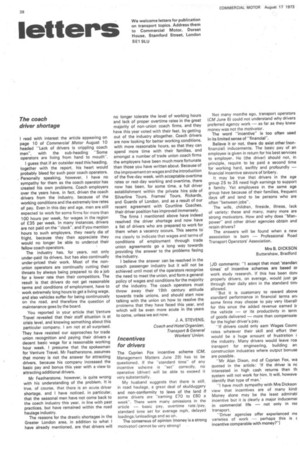The coach driver shortage I read with interest the article
Page 40

If you've noticed an error in this article please click here to report it so we can fix it.
appearing on page 10 of Commercial Motor August 10 headed "Lack of drivers is crippling coach men", with the sub-heading "Some operators are living from hand to mouth".
I guess that if an outsider read this heading. together with the report, his heart would probably bleed for such poor coach operators. . Personally speaking, however. I have no sympathy for them as the coach operator has created his own problems. Coach employers over the years have, in fact, driven the coach drivers from the industry, because of the working conditions and the extremely low rates of pay. Even in this day and age, men are still expected to work for some firms for more than 100 hours per week, for wages in the region of £35 per week. In many instances, drivers are not paid on the "clock", and if you mention hours to such employers, they nearly die of fright, because they then appreciate they would no longer be able to undercut their fellow coach operators.
The industry has, for years. not only under-paid its drivers, but has also continually under-priced their work. Most of the nonunion operators are continually cutting their throats by always being prepared to do a job for a lower rate than their competitors. The result is that drivers do not get reasonable terms and conditions of employment, have to work extremely long hours to get a living wage, and also vehicles suffer for being continuously on the road, and therefore the question of maintenance goes by the board.
You reported in your article that Venture Travel revealed that their staff situation is at crisis level, and knowing something about this particular company. I am not at all surprised. They have resisted our approaches for trade union recognition and paying their drivers a decent basic wage for a reasonable working hour week. I presume that the spokesman for Venture Travel, Mr Featherstone, assumes that money is not the answer for attracting drivers, because his company increased the basic pay and bonus this year with a view to attracting additional drivers.
Mr Featherstone, however. is quite wrong with his understanding of the problem. It is true, of course, that there is an acute driver shortage. and I have noticed, in particular, that the seasonal men have not come back to the coach industry this year, in line with past practices, but have remained within the road haulage industry.
The reasons for the drastic shortages in the Greater London area, in addition to what I have already mentioned, are that drivers will
no longer tolerate the level of working hours and lack of proper overtime rates in the great majority of non-union coach firms, and they have this year voted with their feet, by getting out of the industry altogether. Coach drivers are now looking for better working conditions. with more reasonable hours, so that they can spend more time with their families. and amongst a number of trade union coach firms the employers have been much more fortunate than those you have written about. Because of the improvement on wages and the introduction of the five-day week, with acceptable overtime rates or rest-day working and overtime, there now has been, for some time, a full driver establishment within the private hire side of Silverline Tours, Frames' Tours, Rickards, and Guards of London, and as a result of our recent agreement with Courtline Coaches, their driver position has improved immensely.
The firms I mentioned above have indeed resolved the driver shortage and now have a list of drivers who are prepared to work for them when a vacancy occurs. This seems to me clearly to indicate that wages and terms of conditions of employment through trade union agreements go a long way towards providing the answer to the problems facing the industry.
I believe the answer can be resolved in the coach passenger industry but it will not be achieved until most of the operators recognize the need to meet the union, and form a general policy of wages and conditions for the majority of the industry. The coach operators must throw away their 19th century attitude towards trade unions, and should start now talking with the union on how to resolve the problems that they have faced this year, and which will be even more acute in the years to come, unless we act now.
J. A. STEVENS, Coach and Hotel Organizer, Transport & General
Incentives Workers' Union.
































































































